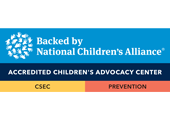Make the commitment to online safety
Community Partners Spotlight: A Safe Place
Community Partner Spotlight: A Safe Place Inc, Nantucket
June 16, 2025
For nearly 30 years, Children’s Cove has provided hope and healing for children across Cape Cod, Nantucket, and Martha’s Vineyard. This is accomplished through collaborative partnerships with local and regional investigative agencies, which allow for a coordinated, multidisciplinary response to cases involving children who have been victims of or witnesses to crime. Ensuring a trauma-informed and child-friendly investigative process is critical in the work we do in the region.
Just as critical is the care children and non-offending families receive following the initial investigation. Once a child makes a disclosure, there may be significant life disruptions for them and their family. Having quick and close resources at hand is critical, which can only be accomplished through community partnerships across the region. When we work with children and families on Nantucket, our most relied upon partner is A Safe Place, Inc.

Since 1987, A Safe Place has played a crucial role in the Nantucket community, offering free and confidential services to survivors of domestic violence and sexual assault. Dedicated to ending violence and empowering individuals, the organization provides direct support, preventive education, supervised family visitation, crisis intervention, counseling, and advocacy. Children’s Cove and A Safe Place have collaborated for over two decades, coordinating care for child victims and their non-offending family members on the island.
A Safe Place, Inc. stands as a vital pillar of support and advocacy, fully committed to eliminating domestic violence and sexual assault on Nantucket. As a free and confidential resource, it offers a lifeline to individuals from all backgrounds, regardless of race, color, immigration status, religion, sex, sexual orientation, gender identity, or disability, ensuring critical support is accessible to everyone in need.
At its core, A Safe Place provides a comprehensive suite of services designed for immediate relief, ongoing healing, and empowerment. A central component is their 24-hour hotline (508-228-2111), offering immediate crisis intervention and emotional support to those impacted by violence. Beyond crisis response, they facilitate various support groups, creating safe spaces for survivors to connect and find solidarity. Individual trauma therapy is also a cornerstone, providing professional guidance through the healing process. Additionally, A Safe Place assists with the legal process, helping individuals navigate the justice system for protection and accountability. Integrated interpretive services highlight their commitment to accessibility, ensuring language is never a barrier to receiving help.
A Safe Place is also deeply invested in proactive community outreach and education. They regularly host events and conduct training programs to raise awareness, challenge harmful norms, and foster a culture of prevention. By engaging with schools, businesses, and community groups, they educate the public on the signs of domestic violence and sexual assault, promote healthy relationships, and equip individuals to intervene safely and effectively. This preventive approach is crucial for breaking cycles of violence and building a safer, more informed community for future generations.
The importance of A Safe Place to the Nantucket community cannot be overstated, especially given the unique challenges of island life. Nantucket’s geographical isolation can make it difficult to access specialized services from the mainland, making A Safe Place a critical, often sole, dedicated resource for these issues. The island’s tight-knit nature, while fostering strong bonds, can also make it harder for victims to come forward due to fear of judgment or lack of anonymity. A Safe Place’s unwavering commitment to confidentiality and non-judgmental support is paramount, providing a haven where survivors feel safe enough to seek help.
We are continually honored to call the team at A Safe Place our community partners in our vision to have a community free from abuse. We look forward to expanding the ways in which we serve the Nantucket community together.
Join our mailing list.
Welcome to the Team Sheena Miller
Welcome to the Team: Sheena Miller
June 17, 2025
Our team is excited to introduce Sheena Miller, the Mental Health Coordinator for Children’s Cove! Sheena joined our team at the end of May, who upon her start brought our team to 10 members, and fully staffed our Center. Sheena’s addition to our team allows us to more readily address the growing need for specialized clinical services in the region. Over the last year Children’s Cove has strategically shifted to being able to provide on-site clinical services. In addition to coordinating referrals with partner agencies, Sheena’s addition will allow us to meet the increased demand driven by rising referrals.
Following investigations of crimes against children, Children’s Cove team members most often coordinate referrals for community-based support services local to the child and their non-offending family. However, the need for specialized clinical care has outpaced the availability of behavioral health services throughout the region. Children and families often face waiting lists for months—or longer—to access the clinical services they need after trauma. There are more referrals for Problematic Sexual Behavior in children which need specific treatment modalities and family work. Ensuring access to evidence-based trauma informed practices is essential for effective care, and as child advocacy center, we must ensure the most vulnerable members of our community receive support sooner.

Sheena Miller joins Children’s Cove to address a range of behavioral health needs. For children with specialized or immediate clinical needs who access Children’s Cove services, Sheena will provide trauma-informed clinical care to support both the child and their family. For families without an immediate need—or for whom traveling to Children’s Cove presents a challenge—Sheena will assist in finding and coordinating appropriate clinical care closer to home.
Sheena holds a Master’s Degree in Clinical Social Work from the University of Georgia and has extensive experience in mental health and clinical social work roles in Florida. Her background includes working with children and families in outpatient, community-based, school-based, and intensive clinical settings. Having recently relocated to the region, Sheena sought to contribute to the community where the need is greatest.
We look forward to our community and behavioral health partners getting to know Sheena, and for the excellent work she will do with the children we serve. Welcome to the team!
Join our mailing list.
It’s Up to You
Learn how to be safe online






